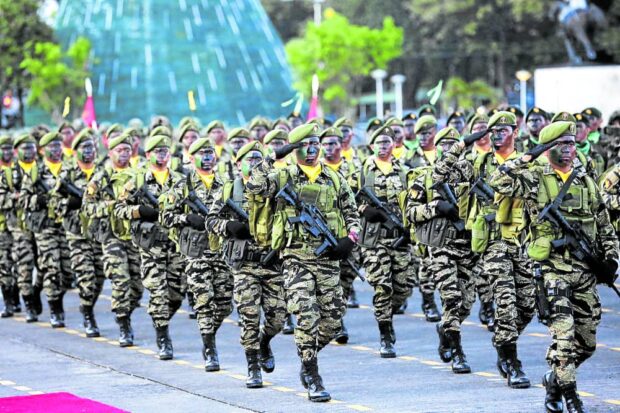MANILA, Philippines — The military and uniformed personnel (MUP) pension reform bill will be fine-tuned during the House plenary’s deliberations after a lawmaker accepted the suggestions made by the Department of National Defense (DND).
Rep. Joey Salceda, chair of the House ways and means panel, accepted the DND proposals to retain full automatic indexation of pensions to present salaries and to limit pension contributions to new entrants.
“I accept the proposals of Defense Secretary Gilberto Teodoro Jr. on the substitute bill on MUP pension reforms. Since the ad hoc committee already terminated proceedings, we will introduce this as amendments to the floor instead,” Salceda said.
Salceda chaired the House ad hoc panel on MUP pension reforms that approved a substitute bill consolidating 12 measures on proposed MUP pension reforms last week.
“I would like to assure Secretary Teodoro that his requests are acceptable. We will adopt his proposal of indexation for all retired and retirables and a transitioned contribution scheme,” he said.
In particular, the defense secretary pushed for 100-percent automatic indexation of pensions to salaries of active MUPs, for the benefit of those who are retired and due for retirement.
He also wanted to limit mandatory pension contributions to new entrants who will contribute 9 percent of their basic pay, while the government contributes 12 percent of their basic pay.
In accepting Teodoro’s suggestions, Salceda stressed that his job was to draft a bill “that will work fiscally but is also acceptable to all stakeholders.”
“If Secretary Teodoro has major concerns, part of my job is to accommodate. Not without the Department of Finance’s (DOF) concerns, of course, but that’s for them to settle in the Cabinet,” he said.
Additional talks
On Friday, Salceda said the House was prepared to refine the MUP pension reform bill, but additional talks should be “based on the principle of shared benefit and shared sacrifice.”
Salceda was then responding to Teodoro’s disagreement with several provisions of the bill approved by the ad hoc committee.
Teodoro opposed the “blanket mandatory contributions” of military personnel to their pensions, and said all pensions and entitlements of soldiers, including the 100-percent automatic indexation of their pensions to salaries of active personnel, should remain unchanged.
The substitute bill approved by the ad hoc panel included the creation of a special assistance fund for indigent retired MUPs, a 3-percent salary increase for 10 years, and uniform rates for lump-sum benefits of MUPs.
It also fixed the mandatory retirement age at 57 for all MUPs and retained the existing provision of allowing MUPs to retire one rank higher.
Salceda said the House was still clarifying with the DND and DOF on concerns pertaining to the mandatory pension contributions from MUPs.
Salceda reminded stakeholders that the MUP pension reform should be “not too expensive, but also not too disruptive,” given that the goal of fiscal sustainability is to ensure that the pension system is substantially preserved “in a way that can still be guaranteed by the State.”
He also warned that there might be “some pushback from the DOF and the economic managers on the Teodoro proposal.”
This is because Teodoro’s suggestions will add “some P1.2 trillion more to the actuarial reserve deficiency, from the current P2.2 trillion under the current substitute bill.”
